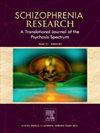精神障碍患者试图戒烟的相关因素
IF 3.5
2区 医学
Q1 PSYCHIATRY
引用次数: 0
摘要
澳大利亚成年人的吸烟率稳步下降,但在患有精神疾病的人群中,吸烟率仍然非常普遍,而且没有变化。更高程度的尼古丁依赖、高比例的大麻共同使用以及更大的可能性与其他吸烟者在一起,可能是患有精神障碍的吸烟者试图戒烟的障碍。吸烟给这一人群带来了健康和社会挑战,因此了解如何更好地解决这一问题至关重要。在这项研究中,我们检查了380名精神病患者的吸烟行为。我们的目的是找出与过去一年尝试戒烟有关的因素。结果显示,81.3%的参与者是终身吸烟者,其中59.5%是目前吸烟者,21.8%已经戒烟。总共有38.1%的当前吸烟者报告在过去一年中曾试图戒烟。与过去一年尝试吸烟的几率显著增加相关的因素包括:不喜欢吸烟、与全科医生讨论吸烟问题、过去一年住院、从事中等到高水平的体育活动,以及停止使用大麻。吸烟越多,试图戒烟的几率就越低。过去一年的心理健康症状与尝试戒烟无关。所有卫生专业人员需要共同努力,降低这一人群的高吸烟率。鼓励和支持精神病患者改变生活方式,包括从事体育活动、停止使用大麻和减少吸烟数量,可能会使更多吸烟者尝试戒烟。本文章由计算机程序翻译,如有差异,请以英文原文为准。
Factors associated with attempts to stop smoking in people with psychotic disorders
Smoking rates in the Australian adult general population have dropped steadily but, in people with psychotic disorders, they remain highly prevalent and unchanged. Higher levels of nicotine dependence, high rates of cannabis co-use and a greater likelihood of being around other smokers may be barriers for smokers with psychotic disorders to attempt to stop. The health and social challenges smoking contributes to this population make it critical to understand how to better address this issue.
In this study, we examined smoking behaviours in 380 people with psychotic disorders. We aimed to identify factors associated with making a past-year attempt to stop smoking.
Results showed 81.3 % of participants were lifetime smokers, of whom 59.5 % were current smokers and 21.8 % had stopped. A total of 38.1 % of current smokers reported making a past-year attempt to stop. Factors associated with significantly increased odds of a past-year attempt included not enjoying smoking, discussing smoking with a GP, a past-year hospital admission, engaging in moderate to high levels of physical activity, and stopping cannabis use. The more cigarettes smoked, the lower the odds of an attempt to stop. Past-year mental health symptoms were not associated with making a stop attempt.
Concerted efforts are needed by all health professionals to reduce the high rates of smoking in this population. Encouraging and supporting people with psychotic disorders to make lifestyle changes including engaging in physical activity, ceasing cannabis use and reducing the number of cigarettes used may result in more smokers making an attempt to stop.
求助全文
通过发布文献求助,成功后即可免费获取论文全文。
去求助
来源期刊

Schizophrenia Research
医学-精神病学
CiteScore
7.50
自引率
8.90%
发文量
429
审稿时长
10.2 weeks
期刊介绍:
As official journal of the Schizophrenia International Research Society (SIRS) Schizophrenia Research is THE journal of choice for international researchers and clinicians to share their work with the global schizophrenia research community. More than 6000 institutes have online or print (or both) access to this journal - the largest specialist journal in the field, with the largest readership!
Schizophrenia Research''s time to first decision is as fast as 6 weeks and its publishing speed is as fast as 4 weeks until online publication (corrected proof/Article in Press) after acceptance and 14 weeks from acceptance until publication in a printed issue.
The journal publishes novel papers that really contribute to understanding the biology and treatment of schizophrenic disorders; Schizophrenia Research brings together biological, clinical and psychological research in order to stimulate the synthesis of findings from all disciplines involved in improving patient outcomes in schizophrenia.
 求助内容:
求助内容: 应助结果提醒方式:
应助结果提醒方式:


